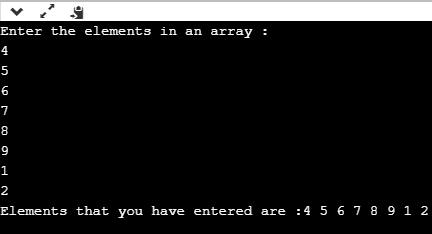What is an Array? ❮ Edit Details
An array is a type of data structure that stores a fixed-size of a homogeneous collection of data. In short, we can say that array is a collection of variables of the same type.
For example, if we want to declare 'n' number of variables, n1, n2...n., if we create all these variables individually, then it becomes a very tedious task. In such a case, we create an array of variables having the same type. Each element of an array can be accessed using an index of the element.
Let's first see how to pass a single-dimensional array to a function.
Passing array to a function
- #include <stdio.h>
- void getarray(int arr[])
- {
- printf("Elements of array are : ");
- for(int i=0;i<5;i++)
- {
- printf("%d ", arr[i]);
- }
- }
- int main()
- {
- int arr[5]={45,67,34,78,90};
- getarray(arr);
- return 0;
- }
In the above program, we have first created the array arr[] and then we pass this array to the function getarray(). The getarray() function prints all the elements of the array arr[].
Output
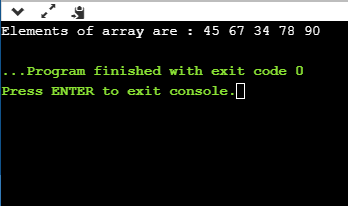
Passing array to a function as a pointer
Now, we will see how to pass an array to a function as a pointer.
- #include <stdio.h>
- void printarray(char *arr)
- {
- printf("Elements of array are : ");
- for(int i=0;i<5;i++)
- {
- printf("%c ", arr[i]);
- }
- }
- int main()
- {
- char arr[5]={'A','B','C','D','E'};
- printarray(arr);
- return 0;
- }
In the above code, we have passed the array to the function as a pointer. The function printarray() prints the elements of an array.
Output
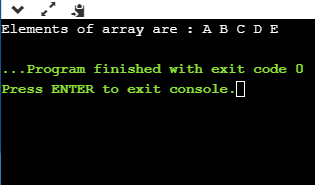
Note: From the above examples, we observe that array is passed to a function as a reference which means that array also persist outside the function.
How to return an array from a function
Returning pointer pointing to the array
- #include <stdio.h>
- int *getarray()
- {
- int arr[5];
- printf("Enter the elements in an array : ");
- for(int i=0;i<5;i++)
- {
- scanf("%d", &arr[i]);
- }
- return arr;
- }
- int main()
- {
- int *n;
- n=getarray();
- printf("\nElements of array are :");
- for(int i=0;i<5;i++)
- {
- printf("%d", n[i]);
- }
- return 0;
- }
In the above program, getarray() function returns a variable 'arr'. It returns a local variable, but it is an illegal memory location to be returned, which is allocated within a function in the stack. Since the program control comes back to the main() function, and all the variables in a stack are freed. Therefore, we can say that this program is returning memory location, which is already de-allocated, so the output of the program is a segmentation fault.
Output

There are three right ways of returning an array to a function:
- Using dynamically allocated array
- Using static array
- Using structure
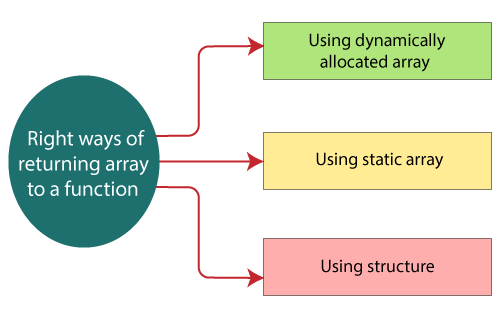
Returning array by passing an array which is to be returned as a parameter to the function.
- #include <stdio.h>
- int *getarray(int *a)
- {
- printf("Enter the elements in an array : ");
- for(int i=0;i<5;i++)
- {
- scanf("%d", &a[i]);
- }
- return a;
- }
- int main()
- {
- int *n;
- int a[5];
- n=getarray(a);
- printf("\nElements of array are :");
- for(int i=0;i<5;i++)
- {
- printf("%d", n[i]);
- }
- return 0;
- }
Output
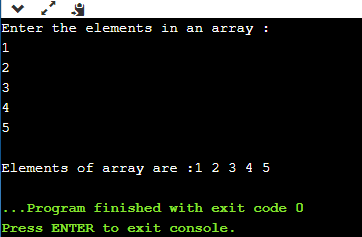
Returning array using malloc() function.
- #include <stdio.h>
- #include<malloc.h>
- int *getarray()
- {
- int size;
- printf("Enter the size of the array : ");
- scanf("%d",&size);
- int *p= malloc(sizeof(size));
- printf("\nEnter the elements in an array");
- for(int i=0;i<size;i++)
- {
- scanf("%d",&p[i]);
- }
- return p;
- }
- int main()
- {
- int *ptr;
- ptr=getarray();
- int length=sizeof(*ptr);
- printf("Elements that you have entered are : ");
- for(int i=0;ptr[i]!='\0';i++)
- {
- printf("%d ", ptr[i]);
- }
- return 0;
- }
Output
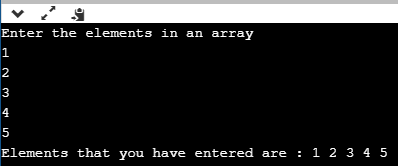
Using Static Variable
- #include <stdio.h>
- int *getarray()
- {
- static int arr[7];
- printf("Enter the elements in an array : ");
- for(int i=0;i<7;i++)
- {
- scanf("%d",&arr[i]);
- }
- return arr;
- }
- int main()
- {
- int *ptr;
- ptr=getarray();
- printf("\nElements that you have entered are :");
- for(int i=0;i<7;i++)
- {
- printf("%d ", ptr[i]);
- }
- }
In the above code, we have created the variable arr[] as static in getarray() function, which is available throughout the program. Th
erefore, the function getarray() returns the actual memory location of the variable 'arr'.
Output
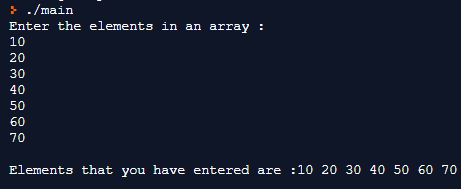
Using Structure
The structure is a user-defined data type that can contain a collection of items of different types. Now, we will create a program that returns an array by using structure.
- #include <stdio.h>
- #include<malloc.h>
- struct array
- {
- int arr[8];
- };
- struct array getarray()
- {
- struct array y;
- printf("Enter the elements in an array : ");
- for(int i=0;i<8;i++)
- {
- scanf("%d",&y.arr[i]);
- }
- return y;
- }
- int main()
- {
- struct array x=getarray();
- printf("Elements that you have entered are :");
- for(int i=0;x.arr[i]!='\0';i++)
- {
- printf("%d ", x.arr[i]);
- }
- return 0;
- }
Output
